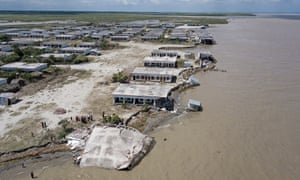Rising sea levels pose a threat to homes of 300m people – study
Figure based on a new analysis of coastlines is more than three times the previous estimate
More than three times more people are at risk from rising sea levels than previously believed, research suggests.
Land that is currently home to 300 million people will flood at least once a year by 2050 unless carbon emissions are cut significantly and coastal defenses strengthened, says the study, published in Nature Communications. This is far above the previous estimate of 80 million.
The upward revision is based on a more sophisticated assessment of the topography of coastlines around the world. Previous models used satellite data that overestimated the altitude of land due to tall buildings and trees. The new study used artificial intelligence to compensate for such misreadings.
Researchers said the magnitude of difference from the previous Nasa study came as a shock. “These assessments show the potential of climate change to reshape cities, economies, coastlines and entire global regions within our lifetimes,” said Scott Kulp, the lead author of the study and a senior scientist at Climate Central.
“As the tideline rises higher than the ground people call home, nations will increasingly confront questions about whether, how much and how long coastal defenses can protect them.”
The biggest change in estimates was in Asia, which is home to the majority of the world’s population. The numbers at risk of an annual flood by 2050 increased more than eightfold in Bangladesh, sevenfold in India, twelvefold in Thailand and threefold in China.
The threat is already being felt in Indonesia, where the government recently announced plans to move the capital city from Jakarta, which is subsiding and increasingly vulnerable to flooding. The new figures show 23 million people are at risk in Indonesia, up from the previous estimate of 5 million.
Benjamin Strauss, Climate Central’s chief scientist, and CEO said more countries may need to follow Indonesia’s lead unless sea defenses were strengthened or carbon emissions were cut. “An incredible, disproportionate amount of human development is on flat, low-lying land near the sea. We are really set up to suffer,” he said.
The authors say the calculations could still underestimate the dangers because they are based on standard projections of sea-level rise in a scenario known as RCP2.6, which assumes emissions cuts in line with the promises made under the Paris agreement. Countries are currently not on course to meet these pledges.
In a worst-case scenario with greater instability of the Antarctic ice sheet, as many as 640 million people could be threatened by 2100, the scientists say.
Strauss said a World Bank study using the old elevation data estimated damages of $1tn per year by mid-century, and this would need to be updated. More sophisticated topographical measurements would also be necessary, he said.
“The need for coastal defenses and higher planning for higher seas is much greater than we thought if we are to avoid economic harm and instability,” said Strauss. “The silver lining to our research: although many more people are threatened than we thought, the benefits of action are greater.”
- This article was amended on 30 October 2019. An earlier version incorrectly said the numbers at risk of annual flooding by 2050 increased more than twelvefold in India. That should have said Thailand. This has now been corrected.
Since we published our pledge…
… focused on the escalating climate crisis, Guardian readers from more than 100 countries across the world have supported us – thank you. Many of you have told us how much you value our commitment: to be truthful, resolute and undeterred in pursuing this important journalism. We are galvanized by your generous support as it makes our work possible.
The Guardian made a choice: to keep our journalism open to all. We do not have a paywall because we believe everyone deserves access to factual information, regardless of where they live or what they can afford.
We will not stay quiet on the escalating climate crisis and we recognize it as the defining issue of our lifetimes. The Guardian will give global heating, wildlife extinction, and pollution the urgent attention they demand. Our independence means we can interrogate inaction by those in power. It means Guardian reporting will always be driven by scientific facts, never by commercial or political interests.
We believe that the problems we face in the climate crisis are systemic and that fundamental societal change is needed. We will keep reporting on the efforts of individuals and communities around the world who are fearlessly taking a stand for future generations and the preservation of human life on earth. We want their stories to inspire hope. We will also report back on our own progress as an organization, as we take important steps to address our impact on the environment.
Thank you again to everyone who supported our pledge. Every contribution from our readers, however big or small, is so valuable. Learn more about why support matters. Support The Guardian from as little as CA$1 – and it only takes a minute. Thank you.


No comments:
Post a Comment